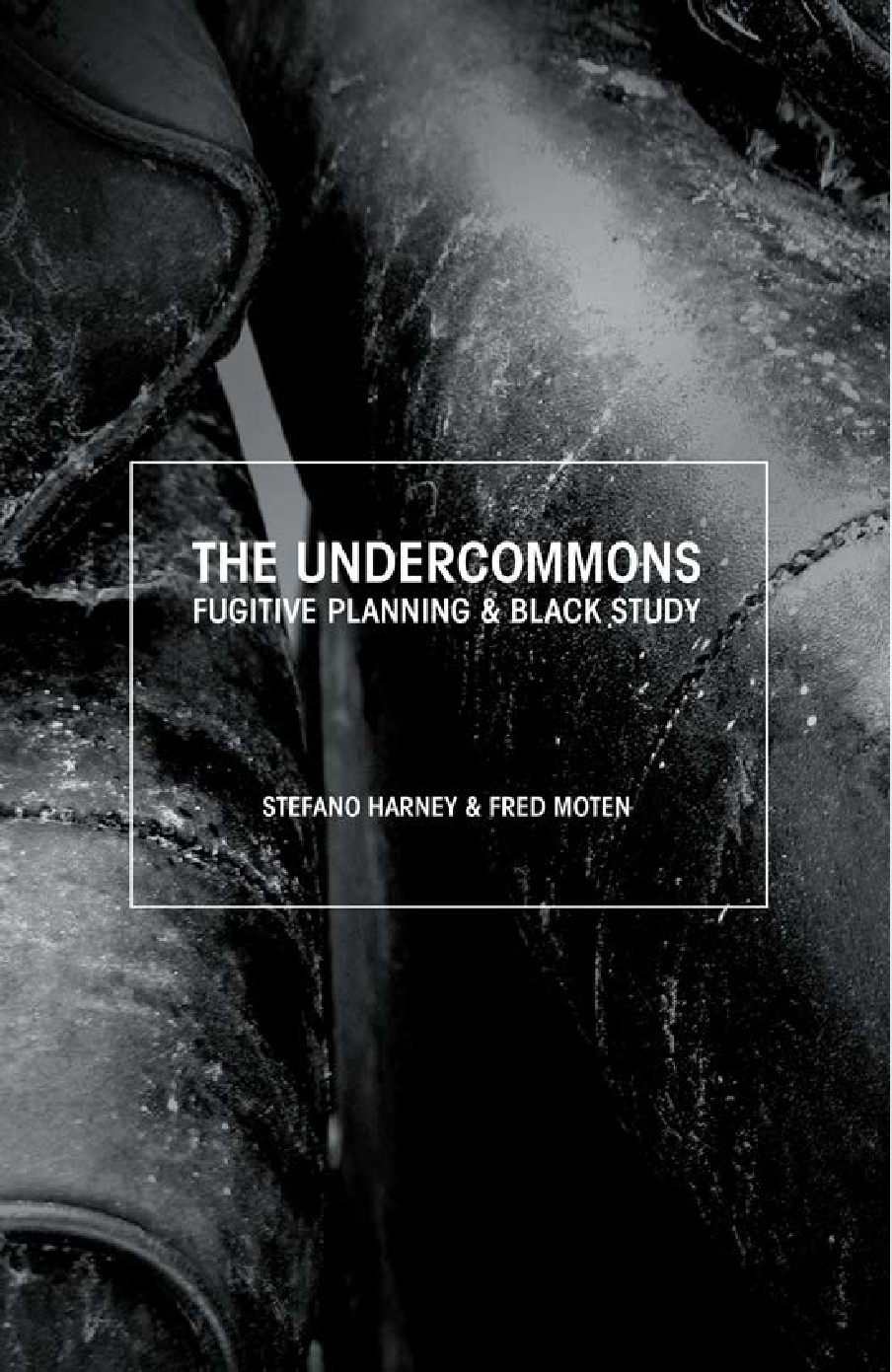Study & Planning
Study and Planning are two terms and concepts with specific meanings introduced by Stefano Harney and Fred Moten in their book The Undercommons: Fugitive Planning and Black Study (2013).
Study
According to The Undercommons by Harney and Moten, study is the spontaneous sociality of lived experience: “study is already going on, including when you walk into a classroom and before you think you start a class, by the way” (Harney & Moten, 2013, p. 112).
Reserves of compassion, willingness to risk, capacity for expression, engagement with culture, and accented voices, all emerge from this kind of study. Pedagogy is intentional and emancipatory, while study in the undercommons is commonplace and unpredictable. In The Undercommons, Harney and Moten state that,
[S]tudy is what you do with other people. It’s talking and walking around with other people, working, dancing, suffering, some irreducible convergence of all three, held under the name of speculative practice… The point of calling it ‘study’ is to mark that the incessant and irreversible intellectuality of these activities is already present. (p. 110)
The use of the word study radically democratizes the idea of learning; it is a challenge to perceptions of curricular education as a monopoly of knowing.
Over, beyond, and around curricular learning, study from The Undercommons takes note of social dynamics. Survival in the broadest sense of the term motivates study. In a less hostile environment survival can be joyful: the “notion of a rehearsal – being in a kind of workshop, playing in a band, in a jam session, or old men sitting on a porch, or people working together in a factory” (Harney & Moten, 2013, p. 110).
However, students in the undercommons experience the hostility of being “different” in a public school context. They know when visibility is against their best interests. Gifted students may pretend not to know answers while illiteracy is deftly covered with bathroom breaks. These are also expressions of study.
Study is a relentless experimentation, incessantly discovering accomplices and employing protective daydreams.
– – –
“Study for them (Harney & Moten) is a mode of thinking with others separate from the thinking that the institution requires of you. And it prepares us to be embedded within what Harney calls the with, and therefore allows you to spend less time antagonized and antagonizing, but also locked into a personal relationship to knowledge – you know, where everything is about your experience, your trauma… What would it mean to think about knowledge production through what I’m calling co-experiencing, thinking with, for and through the other?”
— Jack Halberstam
– – –
Planning (Method)
While study in the undercommons is a sociality that provides refuge, joy, and resilience, planning is the ongoing process of resistance which protects study.
In the terms of complexity theory, planning creates the conditions for study to emerge. Planning defends study, for example, by attending to methods, when economic forces are oriented toward outcomes. In such a case, study thrives in the fascination required to build a car from scratch but is extinguished by a production line.
Planning may then take the form of activism against the process of de-skilling workers. Generally, study is in trouble where labour is detached from purpose, discovery, and agency; and planning poses resistance to such divisions. Resistance may take a passive form like absenteeism or an active form like student strikes; it is an ongoing social experiment.
The subjects of difference who inhabit the undercommons initiate planning in support of further difference:
“…Planning in the undercommons is not an activity, not fishing or dancing or teaching or loving, but the ceaseless experiment with the future presence of the forms of life that make such activities possible” (Harney & Moten, 2013, p. 74).
Importantly, “[p]lanning is self-sufficiency at the social level, and it reproduces in its experiment not just what it needs, life, but what it wants, life in difference…” (p. 76). Planning resists the austerity of conformity.
“I really love that concept of being on an intellectual adventure, and I absolutely think that academia stymies the possibility of having intellectual adventures and that we should all be trying to think together, particularly in these interdisciplinary locations, about how to get back to the surprise, the curiosity, the wonder of knowledge production as opposed to this, you know, attachment to rigor and training that ensures that one generation after the other trots out the same kind of information in the same forms over and over again.
So how do we allow for surprise unanticipated outcome, unpredictable effects?
You can hear in that my emphasis on surprise and unpredictability.”
— Jack Halberstam
____________________________________
Sources:
- Harney, Stefano, and Fred Moten. The Undercommons: Fugitive Planning & Black Study. Minor Compositions, 2013.
- Greer, G. H. “Who Needs the Undercommons?” ERIC – Education Resources Information Center. Last modified 2018. https://files.eric.ed.gov/fulltext/EJ1202639.pdf.
- Halberstam, Jack. “A Path So Twisted: Thinking Wildly With and Through Punk-Feminisms.” University of Oxford. Last modified June 2015. https://podcasts.ox.ac.uk/path-so-twisted-thinking-wildly-and-through-punk-feminisms.
